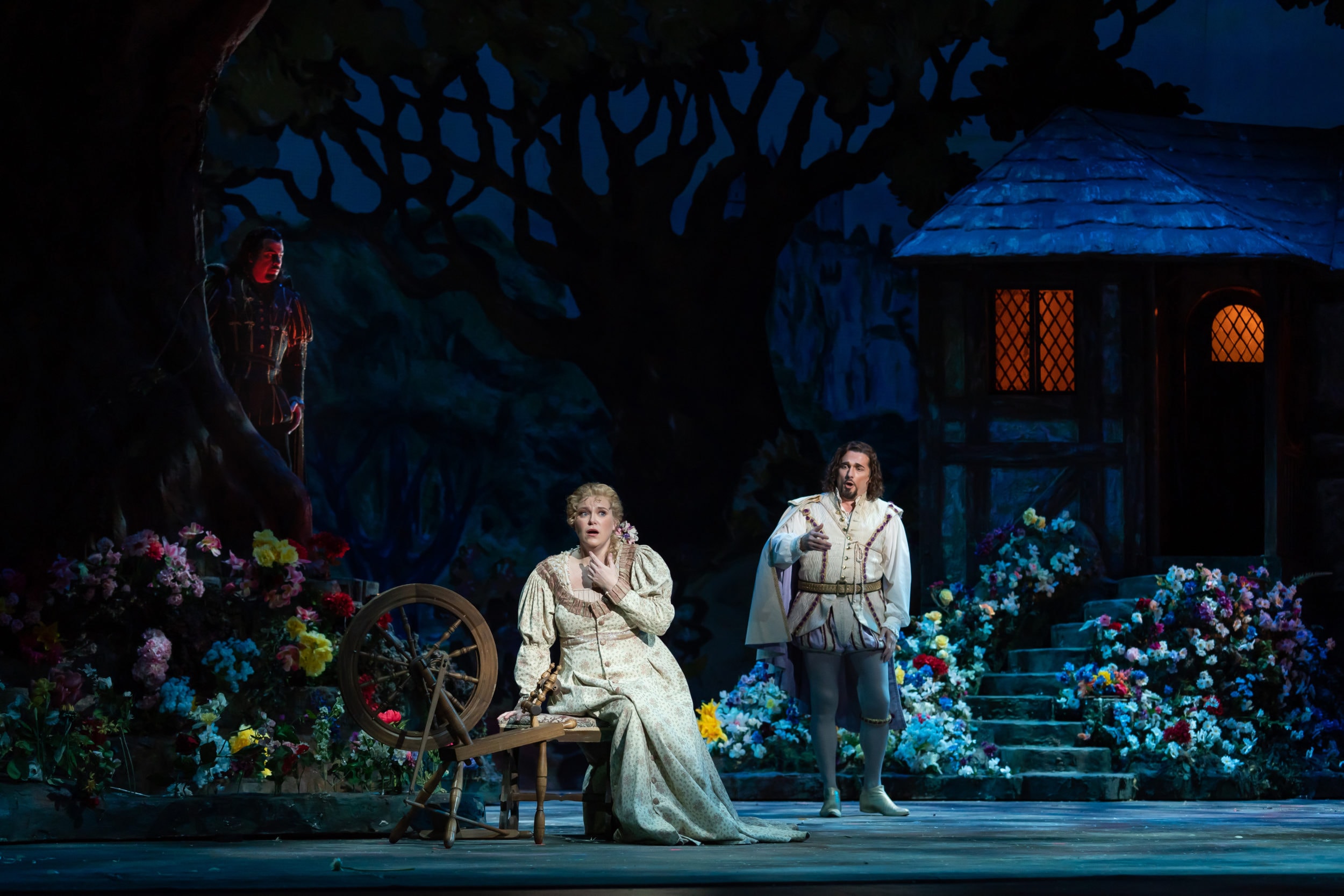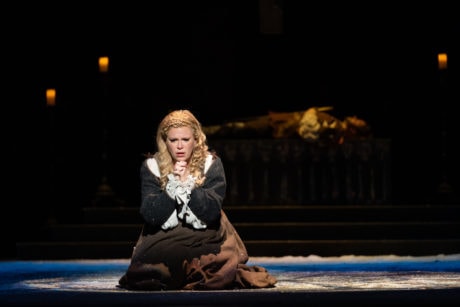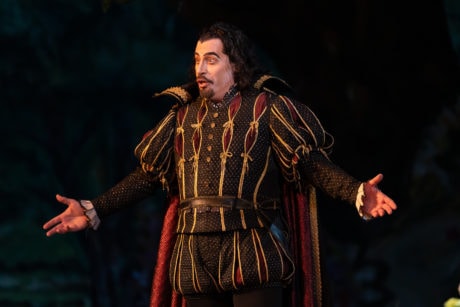It’s been a quarter of a century since Satan came to call on the Kennedy Center, but the Washington National Opera’s production of Faust (with music by Charles Gounod and libretto by Jules Barbier and Michel Carré, based on Goethe’s Faust: Part One), now on through the end of the month, conjures the devil himself with pleasing effect. It’s not so much that absence made my heart grow fonder of the possessed Dr. Faust and the demonic Mephistopheles as it was that not seeing the work in over 20 years, I realized just how prismatic it is of contemporary society and so welcomed its return and the chance to listen anew.

Despite the opera’s eponymous title, Dr. Faust is merely a device for the real action: a battle between good and evil, as depicted by Marguerite and Mephistopheles. Where once audiences might settle into the view that Marguerite is the victim of circumstance, now sitting at the intersection of the #metoo movement and broader public understanding of mental illnesses, I found myself instead considering whether it is willpower that she lacked rather than agency, and if she is ever of sound mind.
Marguerite makes her first appearance not with a flourish, but with merely a few lines rebuffing Dr. Faust’s advances, telling him she doesn’t need an arm on which to hang. She is her own woman! But when an enchanting box of jewels meant to woo her appears courtesy of the doctor by way of the devil, she literally forgets herself and insists she is a king’s daughter. Her grasp of reality and ability to function in society coasts downhill from there.
Ultimately, Marguerite is Gounod’s foil to evil, which is why he lifts her to heaven in the finale, but must she first descend into a madness that looks like Hell on earth where men and a demon take advantage of her? Archetypal references to her fallen woman state are woven throughout, but perhaps we can now see her fall from grace not as her illegitimate pregnancy, but her lack of faith in herself.
Until this performance, it had not occurred to me that the pants role of Siebel, sung superbly by mezzo-soprano Allegra de Vita (a WNO Domingo Cafritz Young Artist graduate), is the show’s feminist conscience, constantly reminding Marguerite that she has value beyond the glitter of jewels and whatever the devil, her dumb lover, or her patriarchal and bitter brother have in mind for her. Such a consideration was probably not on Gounod’s mind, but hearing the opera in today’s times, the question resonates.

As for the rest of les voix, lyric tenor Marcelo Puente as Faust did not have the squillo – the piercing brilliance – necessary to bore through the orchestra, which detracted from the role’s potential to thrill. However, while his top did not shimmer like Pavarotti’s or my favorite Faust of all, the late Swedish tenor Nicolai Gedda, Puente was well cast in this role, as was soprano Erin Wall as Marguerite. They displayed their intelligence as singers, making the most of their respective instruments and singing certain passages with compelling beauty, working within their limitations to give us all they had. Operaphiles must respect this.
In Wall’s case, while I longed for the shimmering high notes like those of Mirella Freni or Renee Fleming, instead her voice was a reliable column of sound that did not disappoint, but also did not move me to distraction. What her voice might have lacked in exceptionality, she made up for with technique and presence.
One of the show’s most beautiful tunes, Avant de quitter ces lieux, is given to Valentin, sung in this production by baritone Joshua Hopkins. He caressed the cavatina with a tender affection that focused my attention on the beauty of the whole, not just his exceptional voice. Please, WNO, may we hear more of Hopkins in the future.
Basso Raymond Aceto’s Mephistopheles was the bulwark of the show and we would do well to hear more of him, too. He is by today’s standards an old-timer, having launched his career in the early 1990s, but that just adds to what makes him special. To hear a veteran like Aceto, whose rich sound and ironic touch is captivating throughout, is to hear a singer who is not only competent and gifted, but uniquely his own. A criticism I have with modern singers is that they are so well and uniformly trained, it can at times sound like robo-singing. Not so with Aceto. He is his own man.

In fact, the collective quirkiness of the primary solo voices amounted to brilliant casting. It was the ensemble moments that moved me most. Every combination of the voices, from the various duets to the quartets were just so darned good. In a show afflicted with characters utterly ignorant of their power to act rather than be manipulated, the cohesive sound of the stars was cosmic relief. Were there not such a deft melding of voices, the show could easily have been as shallow as Dr. Faust and his vapid quest for sensation over wisdom.
The secondary roles of Marthe, sung by mezzo-soprano Deborah Nansteel, and baritone Samson McCrady’s Wagner were also done with fullness and skill. Nansteel is a WNO Domingo-Cafritz Young Artist graduate and McCrady is a current member of the program. Both do justice to their alma mater.
I would like to note to Washington operagoers that WNO’s chorus under the helm of Steven Gathman is excellent – above average for companies this size – and should be given their due: do not forget to applaud them when they sing as well as they did in this performance. They were overall so well-balanced that I was willing to forgive, hard as it was, the bit of unblended sound that emerged in their otherwise gorgeous singing to mark Valentin’s death.
Guest conductor Maestra Keri-Lynn Wilson kept an appropriately dramatic pace, allowing the WNO orchestra to treat the music that denotes Marguerite’s decompensation as sensitively as they did the strains depicting the aching hearts of all those but Mephistopheles’. Concertmaster Oleg Rylatko spun sweet pain from his violin during Faust’s cavatina. It was near perfect.
Earl Staley made his WNO debut as set and costume designer, overseeing the lush stage stuffed with blooms and leafy boughs redolent of a Fragonard painting’s decadent sensuality, but made edgy with a screen of abstract flames that descended when Hell or Mephistopheles was nigh. The production, which originated with the Houston Grand Opera, was near-seamlessly directed by Garnett Bruce, with help from fight coordinator Joe Isenberg, who perhaps would have benefited from a little more time with Hopkins to get his épée under control during the duel scene. The show was lit by Michael Clark, who also made his WNO debut with this performance.
Running Time: Approximately three and a half hours, with two 20-minute intermissions.
Faust plays through March 30, 2019, at the Kennedy Center Opera House, 2700 F St NW, Washington, DC. For tickets, call 202-467-4600 or go online.




